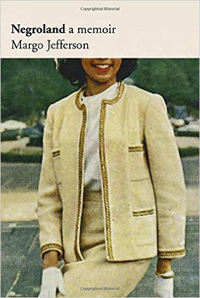 Margo Jefferson, Negroland; A Memoir (New York: Pantheon Books, 2015), 248pp.
Margo Jefferson, Negroland; A Memoir (New York: Pantheon Books, 2015), 248pp.
Margo Jefferson (b. 1947), professor of writing at Columbia University and a winner of the Pulitzer Prize for criticism, was born and raised in Negroland, her evocative neologism for the black bourgeoisie of Chicago. Negroland is populated by the "elite of the colored race," the colored aristocracy, the "blue vein society," the Talented Tenth whose experience was one of privilege and plenty. "I'm a chronicler of Negroland," she writes, "a participant-observer, an elegist, dissenter and admirer; sometimes expatriate, ongoing interlocutor."
Jefferson's father was the head of pediatrics at Provident Hospital, the nation's oldest black hospital. Her mother was a social worker and socialite. Growing up in Negroland, you learned that whites would be just as happy if you were "returned to indigence, deference, and subservience." You were variously indulged, patronized, and resented as an "unwelcome pretender." You were also taught that "most other Negroes" should have emulated you, but in fact behaved in ways that "encouraged racial prejudice."
So, in Negroland, you developed a "hyperconscious identity" that meant "nothing about us is taken for granted by anyone anywhere in the world." Especially not by your own self. You had to bear a "double consciousness" (a term she uses at least three times). You were simultaneously entitled and disenfranchised. In a letter from 1944, for example, her mother writes to a friend about how happy she was, and that "sometimes I almost forget that I'm a Negro. That's something, huh?" Almost — but not quite.
As a "third race," Jefferson loved her black heritage but was alienated from much of it because of her class privilege. She had much more in common with upper class whites, but envied, feared, hated, and disdained them. Her descendants included both the "belittled and despised," and those who had been "rewarded."
In Negroland, then, you grow up with "many selves," or a "constructed self" with many components — the texture of your hair, the shape of your nose, the flare of your nostrils, the size of your lips, various tones of skin color, your diction, and then the social shapers of ethnicity, class, gender, education, history, institutions, family, and friends.
Sometimes Jefferson reproaches herself as an "ingratiating little integrationist." Has she constructed, and deconstructed, her "self" well or poorly? At other times she defuses her angst with humor and irony. There's also despair and suicidal ideation. Most of all, there's a sense of melancholic fatigue about having to think about "RACE" almost all the time.
Jefferson's memoir is a more nuanced reflection about race than the rage and despair of Ta-Nehisi Coates' book Between the World and Me (2015). It reminded me of the work of two other Pulitzer Prize winners: The Warmth of Other Suns (2010) by Isabel Wilkerson, which tells three very different stories about black people who migrated out of the south (including a surgeon who was not allowed to operate on white people); and of Eugene Robinson's Disintegration: The Splintering of Black America (2010), which argues that there's no single interpretive narrative about blacks in America.
Robinson proposes that black America has fragmented into four distinct groups that are "increasingly distinct, separated by demography, geography, and psychology. They have different profiles, different mind-sets, different hopes, fears, and dreams" — an enormous middle class, transcendents like Oprah, Obama, and Tiger Woods, emergents (immigrants from Africa and the Caribbean, and then blacks in biracial marriages), and then the "profoundly isolated abandoned." Jefferson's book is thus a warning about making gross generalizations, and a reminder about just how complex and subtle are the categories of race, class, and gender.
Beyond our shifting self-identities, she concludes with an even deeper question: "am I someone whose character and behavior do not hold the world back? Have I made a viable life for myself?" However tempted she is to "dismantle this constructed self of mine" because she thinks she did it badly, or to declaim that "the human psyche is pathetic," she appreciates the wise response of her therapist: "It's what we have, Miss Jefferson, it's what we have."


